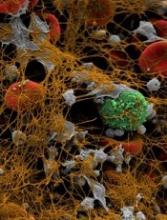Past research indicated that choline, a nutrient found in animal products, is associated with a heightened risk of thrombosis.
Now, researchers have found evidence to suggest that consuming excess choline increases levels of the gut microbial metabolite trimethylamine N-oxide (TMAO), which increases platelet responsiveness, and this raises the risk of thrombotic events.
However, taking low-dose aspirin may reduce that risk.
“This is the first study in humans to directly demonstrate that dietary choline substantially elevates TMAO production by gut bacteria, impacting platelet function,” said Stanley Hazen, MD, PhD, of the Cleveland Clinic in Ohio.
“It provides direct evidence of a mechanistic link between TMAO levels and risk for blood clotting events like heart attack and stroke, the major culprit for the development of cardiovascular events.”
Dr Hazen and his colleagues reported these findings in Circulation.
For this study, the team tested the effects of oral choline supplements in healthy vegans/vegetarians (n=8) and omnivores (n=10). The subjects received choline bitartrate at 500 mg twice daily (about 450 mg total choline per day) for 2 months.
Both omnivores and vegans/vegetarians had at least a 10-fold increase in plasma levels of TMAO at 1 month and 2 months after starting choline supplementation, as well as an increase in platelet responsiveness.
In fact, the researchers observed a dose-dependent association between plasma TMAO levels and platelet function.
The team then set out to determine whether platelet hyper-responsiveness associated with choline supplementation and elevated TMAO would occur in the presence of aspirin.
For this, the researchers evaluated the 10 omnivores after a choline-free washout period of at least 1 month.
The subjects had their platelet function tested at baseline and after taking low-dose aspirin daily (81 mg each evening) for at least a month.
The subjects were then followed for another 2 months while continuing to take aspirin and a daily supplement of choline.
The researchers found that elevated TMAO levels and enhanced susceptibility for platelet activation still occurred, but the TMAO levels were attenuated by aspirin.
These findings suggest that a low dose of aspirin may partially counter the pro-thrombotic effects of a high TMAO plasma level associated with a diet rich in choline, and a high TMAO level can partially overcome the beneficial antiplatelet effects of taking low-dose aspirin.
“Further research is necessary to confirm these findings, but these studies suggest patients without known cardiovascular disease but with elevated TMAO levels may benefit from aspirin and diet modification in preventing blood clotting, which can lead to heart attack and stroke,” Dr Hazen said.
“They also suggest that a high TMAO level in a patient with known cardiovascular disease should be considered for more aggressive antiplatelet therapy.”


